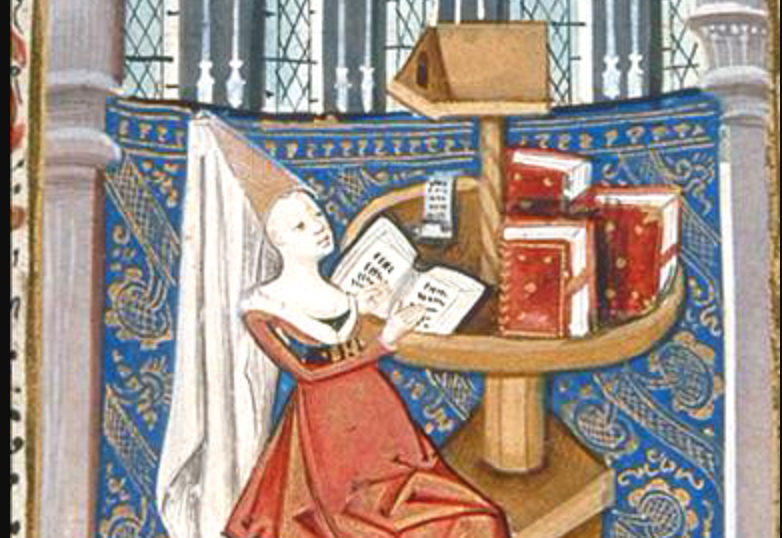Let’s take 10 famous historical historians — one each week — and see what they can achieve with the Bibliography of British and Irish History (BBIH).
The Bibliography is a record of more than 600,000 publications relating to Britain, Ireland and the British world. It’s an essential resource — in many different ways — for every historian, however eminent …
In this episode, we look at how BBIH can help you choose speakers for a conference. Useful for PhD students and early career researchers who are organising their first conference.
Episode 4: Walter Bower organises a conference (and narrowly avoids a manel)

Walter is an eager young Scottish monk. He studied at the University of St Andrews and in Paris, and has just become abbot at the monastery of Inchcolm. He is keen to make an impact on the academic world, and to promote the history of Scotland.
Walter’s undergraduate dissertation looked at the Chronica Gentis Scotorum by John of Fordun, and he would like to understand more about the history, scope and format of chronologies in general. He thinks organising a conference would be a great way of not only exploring different aspects of this field, but of getting similarly-minded scholars together to collaborate on future projects. The only problem is, Walter is relatively new to this field, and isn’t quite sure who to approach.
He goes to his wise friend, Penelope, for advice. ‘So you want to hold a conference about the history of histories..? How very meta,’ she says. Penelope introduces Walter to the Bibliography of British and Irish History. By searching on ‘Chronicles’ written up to the year 1417, the Bibliography gives Walter the most recent results of the current researchers in that subject:

Walter works his way through the results, choosing the people he wants to invite to speak at his conference. Feeling very pleased with himself, he goes back to Penelope and shows her the list. Penelope scans down the names and sighs heavily. ‘Walter, do you notice anything strikingly similar about all the people you have chosen?’ she asks. Walter does not.
Penelope points out that they are all men, all Scottish, and all people that Walter knows. ‘We want to open the debate to as many different people as possible, so we get many diverse opinions. The authors on the Bibliography have all been checked by academic editors, so you can be sure that if they appear in BBIH, their work is of an academic standard. Keeping the conference as an echo chamber is not going to advance the study of history’.
Walter feels slightly foolish, but it is not really his fault, as he is a monk and doesn’t have much interaction with the outside world. Once again the Bibliography comes to Walter’s assistance. The extent of its coverage (a regular download of new monographs, edited collections and chapters, plus articles from a weekly survey of 800 academic journals), means Walter now finds many new authors and potential speakers writing in books and journals with which he’s not so familiar.
And because BBIH is always up-to-date, it includes records of people publishing in relevant areas whose work came out in the current year or very recent past. Surely they’ll be interested in giving a paper as it’s so close to their current research.
The new set of academics Walter approaches are very keen on his idea for a conference, and they work together to make it a success. Due to the inclusive and supportive atmosphere, no one goes over time with their papers, and no one gives rambling long comments instead of questions at the end of someone else’s paper. What a stimulating and well-organised event, everyone says. Thank goodness that Penelope’s good advice prevented Walter from making an academic faux pas!
Walter is so buoyed up with the success of the conference that he decides to write his own history of Scotland. He calls it the Scotichronicon and it too goes on to be studied by later historians. Indeed, BBIH includes records of 29 records of publications about Walter’s best-known work. maybe someone will organise a conference about it?


Find out what happens with our next historian in episode five – available next week on the IHR blog!
Previous episodes:
Episode 1: Bede and the Bibliography
Episode 2: Gerald goes to Ireland
Episode 3: Matthew helps Cecilia prepare for teaching
About Walter Bower …
Bower [Bowmaker], Walter (1385–1449), for whom sadly no image exists, was an abbot at the Augustinian monastery of Inchcolm and a historian. He wrote his Scotichronicon, which was a continuation of John of Fordun’s Chronica Gentis Scotorum. It comprises sixteen books and records events up to the year 1447.
About the Bibliography of British and Irish History …

The Bibliography of British and Irish History (BBIH) is the largest and most comprehensive guide available to what’s been written about British and Irish history, from the early 1900s to 2019.
It’s an essential resource for research and teaching, providing up-to-date information (and links) to more than 610,000 History books, articles, chapters, edited collections and theses.
New records are added in three annual updates. These records are searchable by a wide range of facets including: title, author, chronology, date and form of publication, historical topic and geographical region.
The Bibliography is a research project of the UK’s Institute of Historical Research and the Royal Historical Society, and is published by Brepols. BBIH is a subscription service and is available remotely via university and research libraries worldwide.

